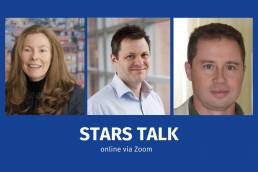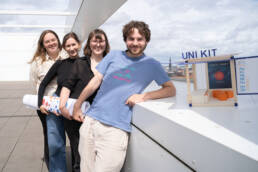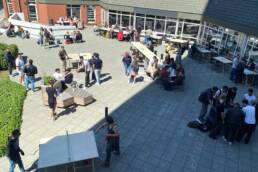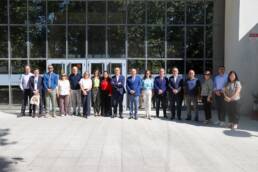STARS EU has launched a program of online seminars in which specialists from the various areas that are part of the alliance will present innovative projects and proposals based on science and knowledge with the potential to support regional development.
Under the name of Stars Talks, these interventions will be open to the entire public through this link on the Zoom platform, and their format will be simple: the talks will be short (between 15 and 45 minutes) and there will be time for the public to debate and ask questions. It is planned that there will be one of these STARS EU Talks every month, ten in total each year.
The dates and speakers of the first three are already known: on April 17, María José Ferreira, Director of Research and Quality of the Portuguese Footwear Research Center, will present “Portuguese footwear cluster – Innovative green materials, processes and products”; on May 15, Mikael Ericsson (University West) will speak on “Sustainable Industry– A New Thematic Interest Group”; and on June 19, José Sigut Saavedra (University of La Laguna) will speak about “Medical Diagnosis using Artificial Intelligence – Application to Retinal Images”. All of them will begin at 13:00 (CET), accessed through the Zoom link mentioned above.
These webinars have been promoted by the alliance’s Challenge Lab and the topics they address will be suggested from the different STARS EU structures. In addition to the focus on regional development, the interventions will also promote EU values and support the Green Transition and Digital Transition processes.
Green materials
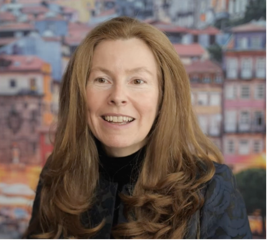
On April 17, María José Ferreira, Director of the Labs and Research and Sustainability Department at CTCP, the Portuguese Footwear Technological and Research Centre, will speak about innovative green materials, processes and products in the Portuguese footwaer cluster. “Our planet is facing challenges that are causing the footwear sector to accelerate its efforts to be sustainable by adopting green and digital solutions”, the expert explains. So, there are many potential areas of intervention, and several variables remain, so significant research and innovation need to be done.
She will explain the global approach of projects like GreenShoes4.0 and BioShoes4All, along with examples of the new and “next generation” of sustainable materials and processes, including biological and biobased materials, man-made bio-based materials, material-to-material recycling, and new concepts of functional, durable, or circular handbags or footwear.
A critical step towards sustainability in footwear is doing a product life cycle assessment (LCA) to measure and reduce its environmental impact throughout its life cycle. Results and strategies to reduce the products’ carbon footprint will be introduced
Maria José Ferreira holds a graduation in Chemistry, a Master in Environmental Sciences, and a PhD in Environmental Engineering. She has experience in R&D project preparation and coordination; physical and chemical testing of footwear and related materials (leather, plastics, rubber, composites, textiles, nanomaterials); and safety at work and environment management. Her research activity is carried out at CTCP in cooperation with industrial companies and R&D entities across Europe, focusing on new materials and processes, sustainability, products with lower environmental impact and recycling.
She has coordinated for CTCP more than 60 projects. She is a member of EU TAB for the EU Product Environment Footprint development and the delegate of Portugal to the Standardisation Committees, enrolled in developing National, CEN and ISO Standards applicable to footwear and related materials.
Suistanable Industry
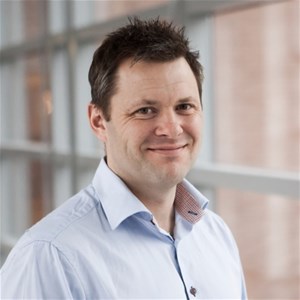
On May 15, Mikael Ericsson will present the new Thematic Interest Group within the STARS EU alliance, that will address the Sustainable Industry. As the expert summarises, under the “Sustainable industry” concept, it can be included both production, new materials, resource-efficient process and product development, and industry close to services such as digitization, energy supply and circular business models.
Mikael Ericsson is head of the Industrial Automation Department of University West, and researcher in technology, production technology. His work is mainly focused on research interests such as robotic welding and robotic welding simulation. He also teaches robotics to engineering students.
AI for medical diagnosis
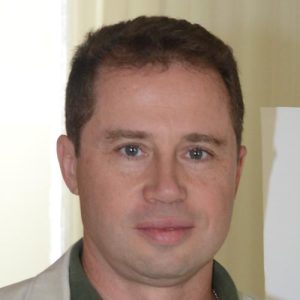
José Sigut Saavedra, from University of La Laguna, will offer the last talk scheduled so far on June 19, “Medical Diagnosis using Artificial Intelligence – Application to Retinal Images”. In his dissertation, he will explain how artificial intelligence can help the medical specialist make a better diagnosis and detect a pathology at a more incipient stage.
In this case, the main focus will be on retinal images which contain very useful information for the diagnosis of eye conditions such as diabetic retinopathy, glaucoma or age-related macular degeneration, among others. This type of diseases can become a major public health problem. Specifically, in the Canary Islands the rate of diabetics is quite high and it is necessary to control the effect that this may have on the retina.
Jose Sigut graduated in Physics from the University of La Laguna in 1993 and received his PhD from the same university in 2002. He is currently Associate Professor at the Department of Computer and Systems Engineering and head of the multidisciplinary group MIAG (Medical Image Analysis Group) formed by members of the Department and the University Hospital of the Canary Islands.
His research activity is mainly focused on the application of Computer Vision and Deep Learning techniques to the automation of diagnosis in the medical field. As a result of this activity, he is co-author of 48 journal articles. He has also published and disseminated the results of his research in 63 conferences. In addition, he has been a visiting professor at the University of Queensland, the Technical University of Munich, the University of Genoa and the University of Iowa.
The next STAR Talks will be announced soon.
Related Posts
July 10, 2025
STARS EU: An intercultural pavilion for a European campus
The Interspace project, developed by students from nine European universities,…
July 7, 2025
“Interspace – O(ut)er Campus” begins with the final project presentation at the Bremen University of Applied Sciences
The project will evolve into a BIP, with its first phase to be developed within…
July 7, 2025
UAMD delegation visits Bragança Polytechnic University to strengthen strategic collaboration
The meeting served to bring together positions in areas as important as…

